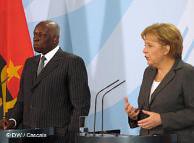
Angolan President Jose Eduardo Dos Santos with Angela Merkel of Germany during a recent visit to Berlin. The German Chancellor visited three African states in July 2011 to discuss energy issues., a photo by Pan-African News Wire File Photos on Flickr.
TRANS-ATLANTIC RELATIONS
All eyes on NSA at EU summit
New reports of NSA spying on Chancellor Angela Merkel have overshadowed the EU summit in Brussels. Europe's top politicians have realized that anyone can be targeted and nothing is secret. Distrust of the US is growing.
As German Chancellor Angela Merkel arrived at the EU summit in Brussels, her official vehicle sported a license plate with the numbers 007 - more famously known as the code name of fictional British Secret Service agent James Bond.
Whether or not the license plate was a simple coincidence, there was no denying that the newest round of spying allegations against the NSA has overshadowed the summit, which was actually meant to deal with economic issues. Merkel, whose mobile phone, according to reports was spied on by the US National Security Agency (NSA), was not in a joking mood on Thursday (24.10.2013). "Spying between friends - that's just not done," said the chancellor in Brussels.
"Trust must be restored," Merkel told the US government, which had assured the chancellor that her mobile phone was not being tapped.
Late Thursday evening, however, the British daily "The Guardian" reported that it had obtained a confidential memo suggesting that the NSA had also monitored the communications of 35 other world leaders.
Martin Schulz, president of the European Parliament, called on EU leaders to suspend the SWIFT agreement and the exchange of banking data with the US, a recommendation already made by the Parliament on Wednesday.
"Data protection must apply, no matter if it concerns the emails of citizens or the mobile phone of Angela Merkel," said EU Justice Commissioner Viviane Reding.
Franco-German solidarity
On the sidelines of the EU summit, Chancellor Merkel and French President Francois Hollande briefly met to speak about the spying activities of the US. After the meeting, a relatively relaxed Merkel said that "being spied on together has brought us closer." On Monday (21.10.2013), Hollande spoke out against the espionage of millions of French citizens by the NSA.
In an interview with DW, Alexander Stubb, Finland's minister for European Affairs, warned of overreacting to this latest news, though. Stubb said that all top politicians must realize they could be spied upon. "I am very careful, and always aware that whatever I communicate could be made public," he said.
Questioning the idea of data exchange with the US was not the best way to react, Stubb added, saying that in the worldwide digital community it was impossible to avoid exchanging information with American companies.
"My fear is that if we go down too hard on the Americans right now, we're going to cause a lot of trouble for data movement from Europe to the United States, and that's going to make our small, medium-sized and big companies suffer," he said. "So there needs to be common sense and justice in data protection, and at the same time, we shouldn't close shop just yet."
Data protection is also part of the "digital agenda" being discussed by the heads of state and government on Thursday evening.
The EU intends to strongly promote the development of a faster Internet and online businesses. There are many untapped opportunities in the digital economy, EU Commissioner Neelie Kroes told DW. In the last few years, the development of mobile phone apps was responsible for creating 300,000 jobs in Europe alone.
Kroes has called for the creation of a single European digital market by 2015, in which there are no roaming charges for data transmission. "We have a single market for everything in the EU but telecommunications.
That's not normal," she said. Companies should be able to operate in all 28 EU countries without being hindered by specific national regulations. At the same time, privacy protection for consumers must be taken into account. "We must find the right balance," Kroes said.
Refugee help
Italian Prime Minister Enrico Letta didn't devote much time to the spying scandal, instead bringing up a particularly pressing problem for his country. "We would like the summit to focus on how to help with migration and find answers," he said. "The case of Lampedusa should never happen again."
Letta came to the summit looking for help with Italy's migration problems
Italy has called for the distribution of refugees and asylum seekers in all EU states under a quota system. Letta wants to do away with the Dublin II regulation that requires asylum seekers to be processed in the country where they first entered Europe.
But the chances of that happening are not great, even after the tragic death of nearly 400 African refugees earlier this month off the coast of the Italian island of Lampedusa. Germany and other EU states have rejected a softening of the Dublin regulation.
European Parliament President Schulz has called for EU leaders to develop new migration policies that provide more possibilities for legal migration.
"Europe is a continent that attracts immigrants. A look at the Mediterranean only confirms this fact," he said. "For that reason we need additional regulations. We can't deal with all immigration in Europe with just the Dublin II agreement." Decisions on that topic, however, are not expected to result from the summit, according to sources in the German government.
And aside from outraged statements, there were also no concrete decisions concerning the NSA scandal. The summit was meeting in the Justus Lipsius building in Brussels, said to have been bugged by the American intelligence service years ago.
"We don't feel very comfortable here anymore," said one EU diplomat with a smirk.
No comments:
Post a Comment